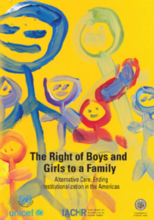Displaying 1141 - 1150 of 1796
Infant Mental Health Journal has published an important Special Issue on Global Research, Practice, and Policy Issues in the Care of Infants and Young Children at Risk. This article reports on a quasi-experimental study commissioned by the Chilean government that had two general aims: (a) to assess infants’ psychoaffective developmental levels and (b) to evaluate whether an intervention based on the promotion of socioemotional development modifies the infant's psychoaffective development.
Infant Mental Health Journal has published an important Special Issue on Global Research, Practice, and Policy Issues in the Care of Infants and Young Children at Risk. In this study the authors assessed internalizing disorders, externalizing disorders, and attention deficit hyperactivity disorder (ADHD) in 54-month-old children living with foster families in Bucharest, Romania.
This article provide one of the most comprehensive assessments of physical growth, biological markers of growth and nutrition, and general behavioral development, in this case conducted on 286 children under 3 years of age living in 10 institutions in Kazakhstan that were globally deficient.
Infant Mental Health Journal has published an important Special Issue on Global Research, Practice, and Policy Issues in the Care of Infants and Young Children at Risk. This article describes the adverse mental health effects of violence and abuse in an institution in Tanzania.
Infant Mental Health Journal has published an important Special Issue on Global Research, Practice, and Policy Issues in the Care of Infants and Young Children at Risk. In this article, behavior problems were studied in fifty 5- to 8-year-old children transferred from a socioemotionally depriving Russian institution to domestic families.
In this review, the authors highlight evidence drawn from research in Australia, the United Kingdom, Canada, Ireland, and the United States, on the impact of growing up in care beyond the early twenties.
This article uses data collected from adoptive parents’ postadoption and governmental data in Romania, Ukraine, India, Guatemala, and Ethiopia to focus on domestic adoption in each of these countries. The article highlights both promising practices in domestic adoption as well as policies and practices that require additional research.
Infant Mental Health Journal has published an important Special Issue on Global Research, Practice, and Policy Issues in the Care of Infants and Young Children at Risk. This article provides a case study of a project to improve the health, safety, and development of children birth to 6 years old in a large orphanage in Nepal.
Infant Mental Health Journal has published an important Special Issue on Global Research, Practice, and Policy Issues in the Care of Infants and Young Children at Risk. This article describes a model of care for abandoned and neglected infants in need of urgent physical, social, and medical support as implemented by the Child's i Foundation, an international, nongovernmental organization operating in Uganda.
This report by the Inter-American Commission on Human Rights (IACHR) analyzes children’s right to live and be raised by their families, and establishes the resulting obligations for States when it comes to supporting and strengthening families’ ability to raise and care for their children.

